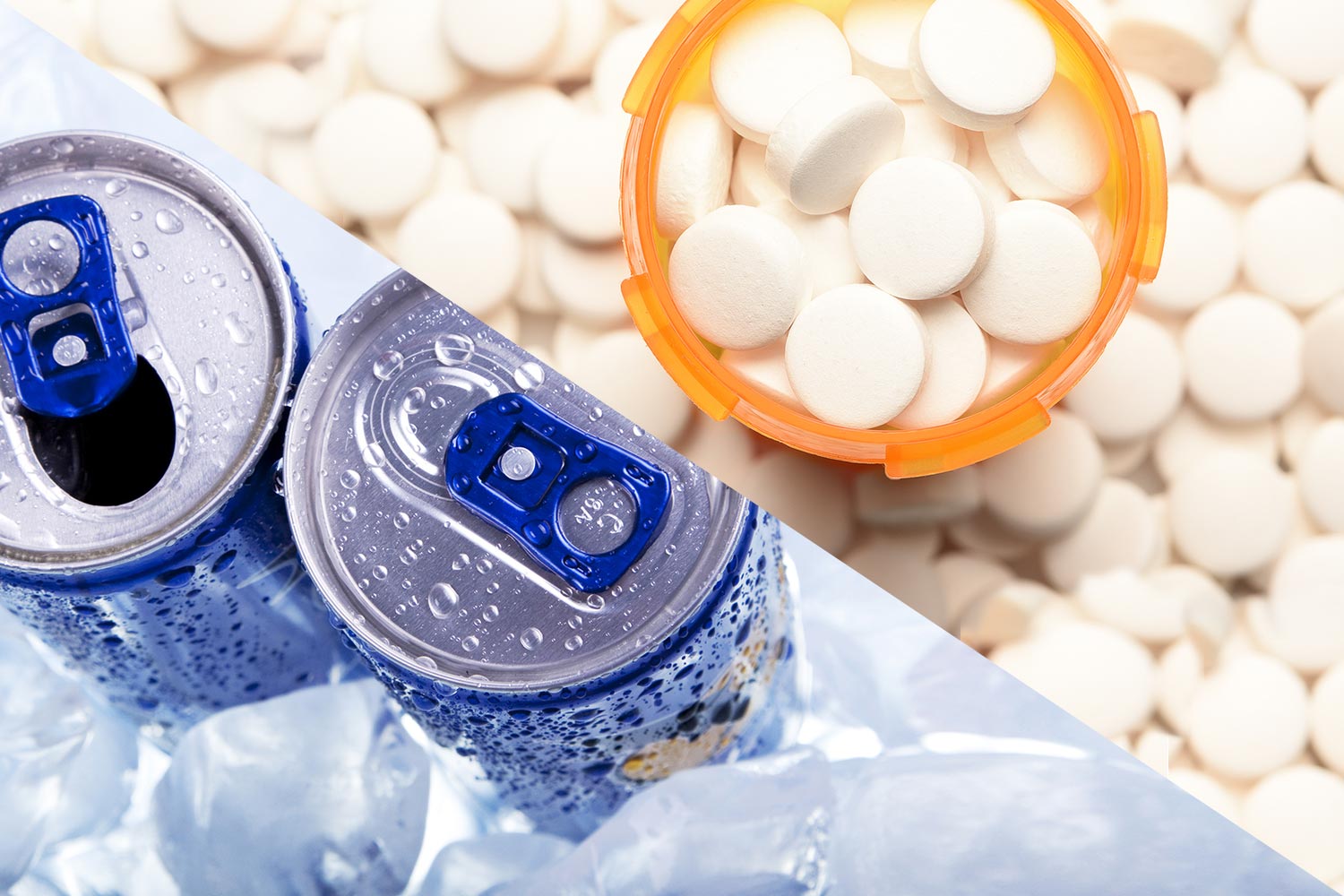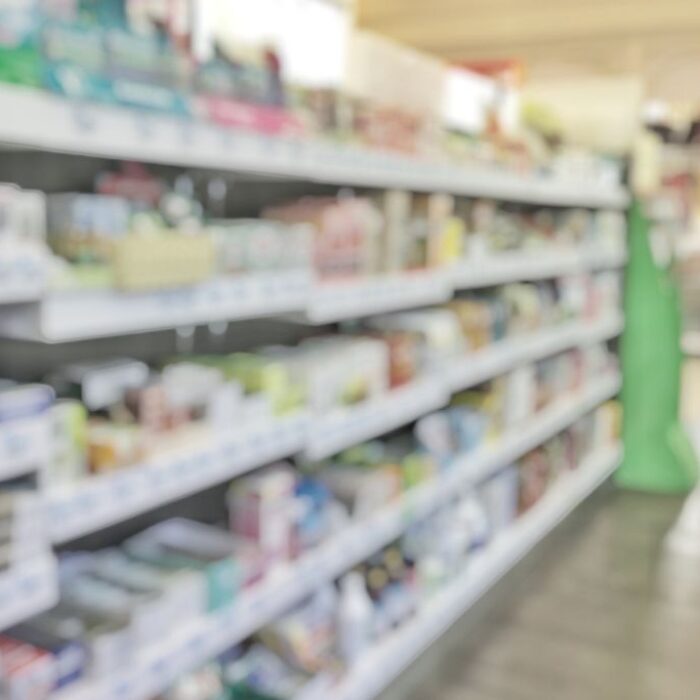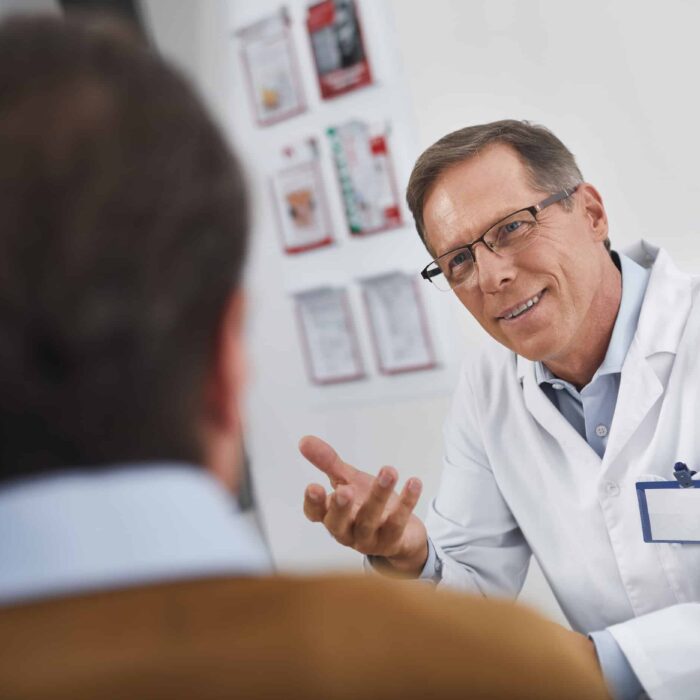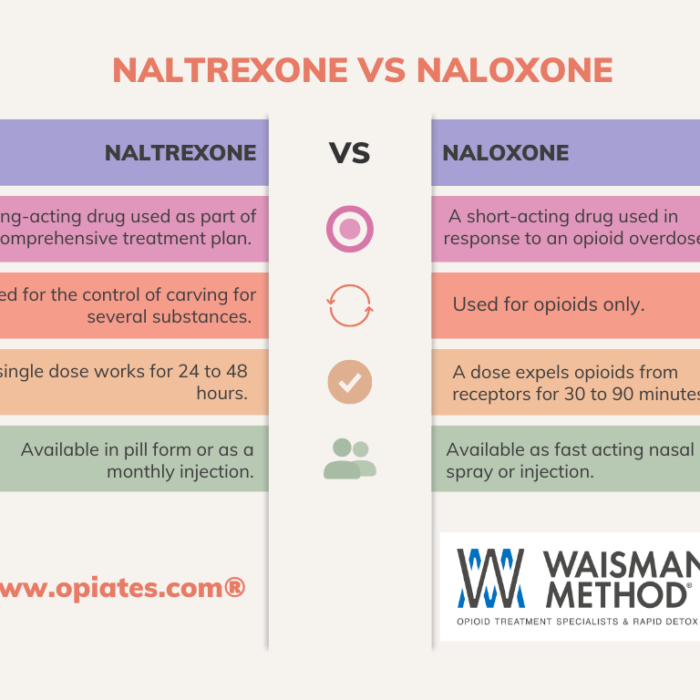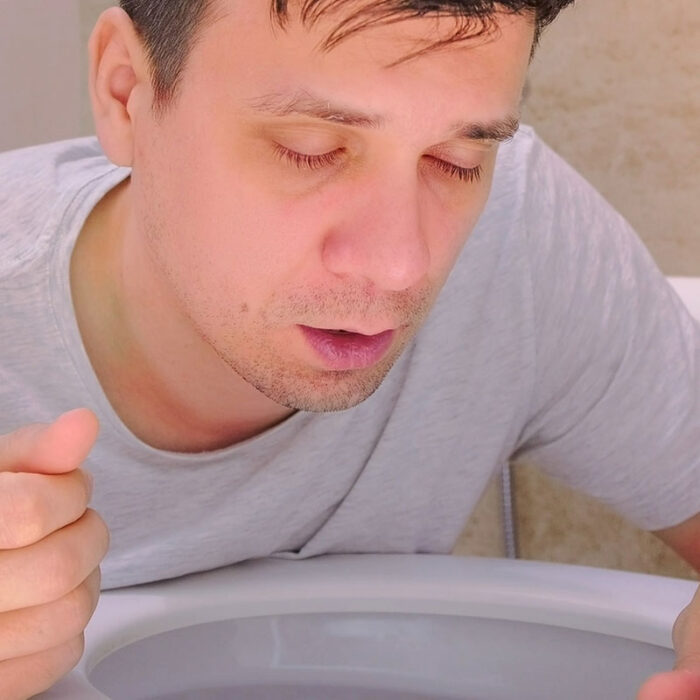Written by Sara McEvoy, PT, DPT
Think painkillers are the most commonly consumed drug in the world? Think again. That distinction actually goes to caffeine – and it’s not just coming from coffee and chocolate, either. Energy drinks, such as Red Bull, Monster, Rockstar, Bang, and Celsius, have become increasingly popular. In 2020 energy drink sales in the United States reached $3.7 Billion, and is forecast to reach $28.25 Billion by 2027. 85% of people in the US consume at least one caffeinated drink daily.
Unfortunately, alcohol use and opioid use disorder are also increasing. This begs the question:
What happens when people mix energy drinks and painkillers, alcohol, or other prescription drugs? Are there adverse effects people should be aware of?
What’s In Energy Drinks and Why They Don’t Mix Well With Other Drugs
Energy drinks are non-alcoholic beverages containing caffeine – often in high amounts – as well as other plant-based stimulants and additives like taurine, carnitine, yerba mate, B vitamins, yohimbine, ginseng and ginkgo biloba. Many of these drinks also contain guarana, also known as Brazilian cocoa. One gram of guarana is equal to 40 to 50 mg of caffeine. For reference, 1 cup of coffee contains about 95 mg of caffeine.
The United States Food and Drug Administration (FDA) requires labels to state whether a product contains caffeine, but these labels don’t have to list the actual amount. Plus, many energy drinks contain more than one serving. So, you could be getting a lot more than a single dose of caffeine after downing an entire can of Monster. And consuming too much caffeine, a central nervous system stimulant, can lead to a range of health effects like blood vessel dilation, rapid heart rate, elevated blood pressure, and dehydration.
Of course, many people consume caffeine responsibly and safely on a daily basis, but plenty of individuals find ways to make it unsafe. For example, combining other substances with energy drinks has become quite popular, especially among males between the ages of 18 and 34. One 2007 study in Nutrition Journal found that more than half (54%) of surveyed college students consume energy drinks with alcohol or other drugs.
The problem is, caffeine can partially mask the effects of alcohol (a depressant), which can make people feel artificially alert. This could lead someone to consume even more alcohol and therefore become even more impaired. According to the National Center for Complementary and Integrative Health, students who combine alcohol with energy drinks binge-drink more often and “are more likely than drinkers who do not mix alcohol with energy drinks to report unwanted or unprotected sex, driving drunk or riding with a driver who was intoxicated, or sustaining alcohol-related injuries.”
Direct effects of substances like alcohol mixed with caffeine aren’t the only dangers. Some research suggests caffeine may “prime” a teenager’s brain for greater drug use later in life. Consuming alcohol with caffeine may even increase the risk of opioid use disorder.
On Energy Drinks and Drug Use: A Doctor’s Perspective
We asked Dr. Michael Lowenstein, medical director of Waismann Method®, about the problem with energy drinks and drug use – as well as some surprising health effects of caffeine.
He starts by saying that excess consumption of sugary energy drinks can contribute to stomach problems and “dysfunctional guts,” which is something a majority of Americans face today:
There’s a lot of bacteria and yeast that shouldn’t be , and what feeds these bad bacteria and yeast is sugar. All this simple sugar feeds the pathogens and bad stuff in the gut.
Unfortunately, gut dysfunction is associated with an increased risk of issues like gastrointestinal upset, impaired immunity, autoimmune disorders, depression, nutrient deficiencies, and even autism. Plus, Dr. Lowenstein says, alcohol, pharmaceutical drugs, and even caffeine can all lead to vitamin depletion—which means that combining energy drinks with substances “just makes worse.”
And remember: many people consume far more caffeine than they realize, especially when they consume energy drinks. And most energy drinks are also jam-packed with other stimulants that also carry their risks, according to Dr. Lowenstein:
The B vitamins, the guarana, the taurine – any of those things in excess can cause nausea and vomiting. If you have hypertension or anything like that, all the caffeine will make it worse. And … with too much caffeine, you’re not going to sleep well. You start messing with the sleep-waking cycle, too.
In his work with patients with opioid use disorder, Dr. Lowenstein sees the way prescription painkillers, sleep, and caffeine co-mingle:
People take prescription drugs for pain. The pain goes away, and they continue to take them. Eventually, they become tolerant, which means they need higher dosages. Higher dosages of opioids make you sleepy, which leads them to reach for energy drinks.
Alternatively (or additionally), sleep-deprived people often begin taking a prescription medication like Ambien – or even more painkillers.
“It can become a cycle,” Dr. Lowenstein warns.
3 Things That Might Surprise You About Energy Drinks
In case you’re curious, we’ll wrap up with three surprising things about energy drinks that put this important topic into perspective:
- Yes, people go to the emergency room every year because of energy drinks. But about 27% of these ER visits involve the combination of energy drinks and opioids or other prescription painkillers, as well as nervous system stimulants like Ritalin. Another 16% of energy drink-related ER visits involve alcohol, and 10% involve illicit drugs.
- Women aged 18 to 39 are most likely to end up in the ER for energy drink plus pharmaceutical-related issues. This could be because women are generally smaller and therefore are more significantly impacted by the effects of these substances.
- Energy drink consumption over time can lead to dependence and withdrawal symptoms.
The Bottom Line
Consuming energy drinks containing caffeine can be problematic on its own. But when you combine energy drinks with prescription drugs, alcohol, and other substances, you expose yourself to both short-term and long-term health problems.
Do you need help managing your illicit or prescription drug use?
Call us today for a Private Consultation and learn more about our comprehensive treatment options.
Sources
- NCBI: Caffeine and Substance Use Disorders
- Science Direct: Trends in Energy Drink Consumption Among U.S. Adolescents and Adults
- Statista: Energy drink sales in the United States from 2017 to 2021
- The Lancet: Global Alcohol Exposure Between 1990 and 2017 and Forecasts Until 2030: A Modelling Study
- NIH: Opioid Overdose Crisis
- Consumer Report: The Buzz on Energy-Drink Caffeine
- NIH: Energy Drinks
- Nutrition Journal: A Survey of Energy Drink Consumption Patterns Among College Students
- CDC: Alcohol and Caffeine
- NIH: Energy Drinks and Drug Use – A Surprising Connection
- NIH: Adolescent Nonmedical Use of Opioids and Alcohol Mixed with Energy Drinks
- Med Alert Help: 20 Must-Know Energy Drink Statistics and Facts for 2021
- Research and Markets: United States Energy Drink Market Forecast 2021-2027, Industry Trends, Share, Insight, Growth, Impact of COVID-19, Opportunity Company Analysis
Sara McEvoy, PT, DPT is a licensed and board-certified doctor of physical therapy. She earned her undergraduate and graduate degrees from Boston University. Sara is also a professional freelance writer and copywriter. She researches and writes primarily within the health and wellness fields.
Reviewed by Clare Waismann, Registered Addiction Specialist (M-RAS), Substance Use Disorder Certified Counselor (SUDCC II)
Disclaimer: The content of this article is intended for informational purposes only. It is not a substitute for professional advice or consultation. Despite the contributions from Clare Waismann, M-RAS, SUDCC II, and the expertise of our editorial team, information is subject to change, and readers are encouraged to seek direct expert guidance before acting upon any information provided here.
Opiates.com blog references various sources for its content. Always consult with a healthcare professional regarding any concerns or questions.

